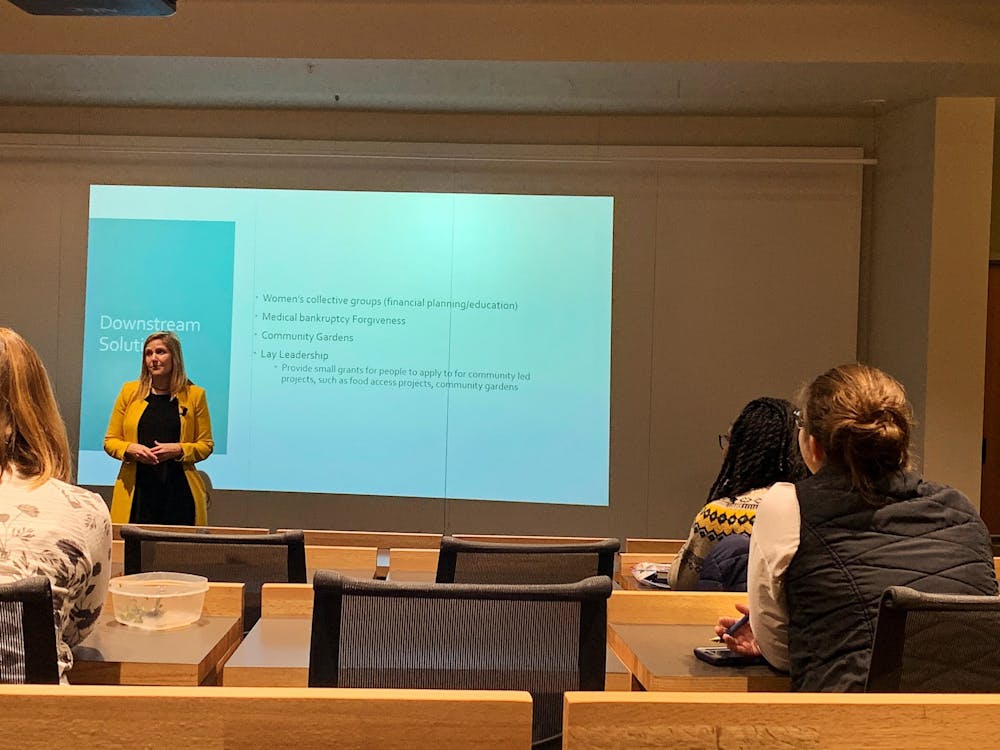Medical anthropologist and Associate Professor of Global Health at Georgetown University Emily Mendenhall gave a talk titled “Rethinking Diabetes: Entanglements with Trauma, Poverty and HIV” at the School of Public Health on Feb. 27, for the Social & Behavioral Interventions (SBI) Program. Mendenhall is the author of Rethinking Diabetes: Entanglements of Trauma, Poverty and HIV.
She began the talk by chronicling her early experiences in Chicago, where she worked with Mexican immigrants on issues of acculturation, health care and diabetes. She explained how this work inspired her to consider the centrality of trauma and poverty in the national and global narrative of diabetes.
“At the center of these [immigrants’] stories was trauma. At the center of these stories was crisis and displacement and feeling unsafe due to being undocumented... or living on the edges of financial stability,” Mendenhall said.
Mendenhall emphasized that her research in Chicago, as well as her later research in Mexico, India, Soweto and Kenya, for her book, shows that the complex narrative of diabetes cannot truly be understood if studied in isolation.
“Trauma, forced relocation, and fragmented social worlds cannot be removed from the story because there are real biological and pathological pathways of trauma and chronic stress that lead to diabetes, from epigenetics to psychophysiology,” she said.
After outlining her interviewing style, which she said takes about three to six hours per interview, Mendenhall divided the remainder of the talk into four sections. She dedicated each section to a case study from a specific country and the socioeconomic and cultural considerations that individuals living with diabetes must consider in that country.
Mendenhall’s first case study focused on a woman named Lupe who immigrated from Mexico with her husband. She explained that while Lupe was concerned with her diabetes and tried to closely monitor her diet, she often forgot to take her pills, spent most of her time alone and rarely exercised as gun violence was common in her neighborhood.
Mendenhall emphasized that Lupe’s story can show how poverty, stress and isolation associated with immigration and unsafe living conditions are intertwined with the metabolic realities of her diabetes diagnosis.
She then proceeded to draw parallels between Lupe’s story and the research she did in Chicago with 121 low-income Mexican immigrant women who had been diagnosed with severe diabetes. Mendenhall stated that of these women, 23 percent reported experiences of sexual violence, 53 percent reported experiences of physical violence and 66 percent reported experiencing other types of abuse.
Mendenhall’s second case study focused on an Indian woman named Meena who experienced frequent abuse from her mother-in-law at an early age, and when she was eventually diagnosed with diabetes, her daughter-in-law told her to not worry about it because everyone had diabetes.
“[Meena and her family] paid for Ayurvedic medicine when they could. Overcrowding in government hospitals caused stress and private clinics were too expensive. Meena found diabetes was common and accepted among her family and friends,” she said.
Mendenhall’s third case study was about a woman named Flory from Soweto, South Africa who fell into a deep depression after her father passed away unexpectedly and her brother died. She stated that after losing a significant amount of weight due to inadequate diet, Flory was diagnosed with diabetes.
“In many narratives, people have experienced stress throughout their lives, but at one critical point there was a crisis,” she said. “When stress becomes too compounded, the stress linked to that period of time is also linked to chronic illness.”
Mendenhall’s fourth and final case study discussed a woman named Esther from Kenya who had to pay out-of-pocket for the diabetes screen and for her prescribed insulin. She explained that for Esther, paying for insulin seemed outlandish when she she had no electricity and no refrigerator. As insulin is not free, many of the diabetic individuals who Mendenhall interviewed reported often resorting to rationing insulin, taking it only when they felt especially bad.
At the end of the talk, an audience member from the SBI Program asked Mendenhall about the impact of resilience in diabetes outcomes.
Mendenhall answered by drawing similarities between the role of resilience and that of community.
“Resilience is experienced differently from place to place. When people talk about resilience, they talk about it in collective terms. It’s more of a collective hope,” she said. “Resilience is incredibly important... for well-being... and emotional balance.”





